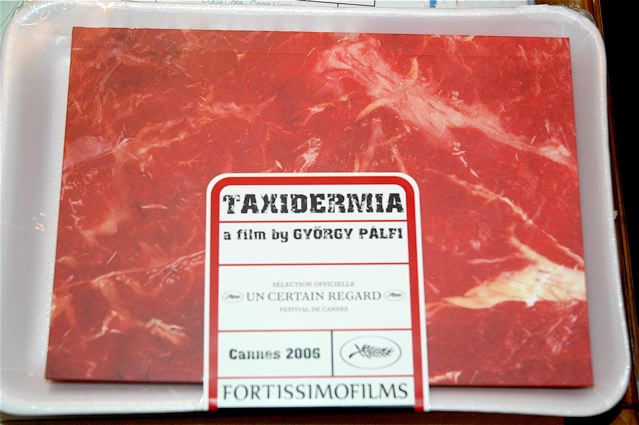CANNES, France – In one of the bravest acts of courage I have performed in the exercise of my duties at the Cannes festival, I went out to dinner Thursday night. The company was exhilarating and the food was superb, but let me tell you about two movies I saw before dinner. Both were official selections. “Fast Food Nation” is about how meat arrives in franchise burgers, and what might be in it besides meat. “Taxidermia” is about a man who invents a machine that eviscerates and stuffs its occupant, stitches up the incisions, and chops off his head and one arm.
During these films I saw great big gobs of greasy grimy guts: Livers, spleens, intestines, hearts, lungs, and a young woman taught how to “pull out the kidneys.” I saw hooves, ears and snouts sliced off, skin stripped from carcasses, rivers of blood, intestines poured into pots. That was in a meat processing factory in “Fast Food Nation.” In “Taxidermia,” a pig is reduced to its elements, and what goes on sexually does not bear mentioning.
“Taxidermia” is by Gyorgy Palfi, the Hungarian director of “Hukkle” (2003), a sort of wonderful movie almost entirely without human sounds except for hiccups. I am sure “Taxidermia” it is an important film and certainly a brave one, but I doubt if I know anyone who would thank me for recommending it.
“Fast Food Nation” was written by Eric Schlosser, author of the best-seller of the same name, and directed by Richard Linklater, the brilliant Austin-based director of “Waking Life,” “Slacker,” “School of Rock,” “SubUrbia,” “Tape” and “Dazed and Confused.” It is not a documentary, but a fact-based dramatization using parallel stories. One involves Greg Kinnear as fast food marketing executive on a fact-finding mission; his boss asks him to investigate reports that fecal matter is being found in the chain’s hamburgers. The other is about undocumented Mexicans supplied as low-salaried employees in a vast food processing plant where not all the legs sliced off belong to cows.
The movie is not sensational, unless we consider factual footage of cattle being slaughtered on an assembly line to be sensational, and why should we? That’s how most of America’s meat gets to most of America’s meat-eaters. The film has no special statement to make on “guest workers” in terms of the current national debate: It simply observes how they are imported (at their own cost) and supplied as cheap labor to a meat factory where Americans are not keen to work.
The film produces a great sadness and a greater queasiness. It is not about heroes, but about ordinary working people. There is a conversation between the Kinnear character and a key supplier of meat (Bruce Willis) that in its quiet, factual ruthlessness is probably just about how such people discuss such matters. The Willis character argues that there has always been a lot of stuff in meat besides meat, and if the burgers are grilled at a high temperature, what’s the difference?
College students who work part-time in a fast food outlet begin to hate their jobs, and learn that the meat plant’s holding lots for cattle produce more urine and feces than all of the people in Denver, none of it treated, all of it seeping into groundwater. They take direct action against the company; the result is not high drama but a sad joke – on the cattle, I think.
You can’t make an omelet without breaking eggs, or a burger without slaughtering cows, which reminds me of the chicken who suggested ham ‘n’ eggs to the pig, who replied: “For you it’s a donation, but for me it’s a commitment.” I am also reminded of Roy Rogers having Trigger stuffed and joking, “When I die, I want to be stuffed and mounted on Trigger,” and Dale Evans saying, “Now, Roy, don’t you be getting’ any ideas about me.”
I want to write a lot more about “Fast Food Nation” — and “Taxidermia,” for that matter. I’ve gone through periods of being a vegetarian in my life, and I sense another one coming on. My interest in taxidermy remains minimal.












